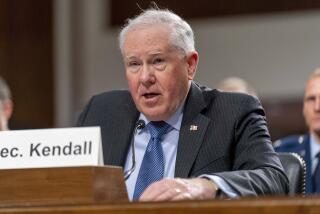Defense Official Blasts System for Export of Militarily Sensitive Material
- Share via
WASHINGTON — A key Defense Department official on Thursday assailed the government’s system for controlling exports of militarily sensitive hardware, saying that the Clinton administration has “neutered” the Pentagon’s security procedures in its ardor to increase high-tech exports.
Peter M. Leitner, a senior career-level official in the Defense Technology Security Agency, told the Senate Governmental Affairs Committee that the administration has turned procedural safeguards into a “Potemkin Village constructed to deceive Congress and the American people and lull us into a false sense of security.”
In place of conscientious scrutiny, he said, officials have routinely approved sales of supercomputers, machine tools, laser devices and other hardware that could help U.S. adversaries build nuclear-tipped missiles and cutting-edge weaponry. And he accused Pentagon officials of overruling subordinates who want to challenge export requests.
The formal process has “failed its stated mission: to safeguard the national security of the United States,” Leitner told the panel, which is examining the administration’s decisions to let U.S. companies launch satellites on Chinese rockets.
Pentagon officials took specific exception to the accusations made Thursday by Leitner, who has been a senior advisor in the export licensing process for 12 years. They characterized him as a well-known, public critic of the system and insisted that sales of sensitive hardware are still closely reviewed by a number of agencies.
During the committee hearing, Leitner’s portrayal of the process was described as “absolute nonsense” by Franklin Miller, the deputy assistant Defense secretary in charge of proliferation issues.
However, Sen. Fred Thompson (R-Tenn.), who chaired the session, said Leitner’s testimony suggests that “you can export anything, to anybody, at any time.”
Administration officials have argued generally there has been less need for tight controls in the aftermath of the Cold War, particularly with the wide availability of high-tech equipment from European and other sources.
Leitner, in his testimony, said he had witnessed several attempts by Pentagon superiors to get other officials to alter or reverse recommendations that would have blocked export sales.
He said he had been taken off a case in 1994, when he opposed a $5-million sale of McDonnell Douglas Corp. machine tools to China. Later, the machine tools were diverted by the Chinese to help make military aircraft, U.S. officials have acknowledged.
Leitner said the Defense Technology Security Administration, which operates under the supervision of the Defense Department, now approves 70% of export sales applications within 24 hours and with little information on the technology and how it might be used.
He said officials are increasingly unwilling to press appeals within the Pentagon hierarchy, even though a 1995 presidential order is supposed to increase the number of government organizations that take part in reviewing such applications.
He cited Pentagon statistics showing that far fewer cases are sent to the military services for their review and recommendations.
Leitner said Pentagon officials, in an effort to isolate the more security-minded State Department and Arms Control and Disarmament Agency, have told the agency to side in export-licenses debate with the sales-oriented Commerce Department. Under questioning, however, he declined to identify which Pentagon officials had given such orders, saying that it was inappropriate to provide names in a public session.
In a later interview, Leitner said his superiors had reacted to his history of dissent “mostly by trying to ignore me.” While his criticism has affected his annual performance evaluations, he said, his bosses so far have not changed his duties.
Meanwhile, a House select committee on the China satellite issue met for the first time Thursday, a closed session that focused on setting internal rules and hiring staff for the $2.5-million inquiry that must conclude by year’s end.
Rep. Christopher Cox (R-Newport Beach), chairman of the nine-member panel, said lawmakers would work through the congressional recesses to complete a final report by Jan. 2. The core issue: whether technology transfers to China aided that country’s ballistic missile program.
In a departure from the partisan rancor that has marked other recent congressional inquiries, Cox and the panel’s ranking Democrat, Rep. Norman D. Dicks of Washington state, have opened the investigation on a harmonious note.
One issue addressed during the session, lawmakers said, was concern that the inquiry might suffer because other congressional committees are investigating the same issue.
“There is some concern that you could have too many investigations going on at once,” Dicks said.
Cox said his investigation would not focus on fact-gathering in China. “We have only six months to operate, and getting information from people who don’t want to give it to us is not a good plan of attack.”
Times staff writer Marc Lacey contributed to this story.
More to Read
Sign up for Essential California
The most important California stories and recommendations in your inbox every morning.
You may occasionally receive promotional content from the Los Angeles Times.














